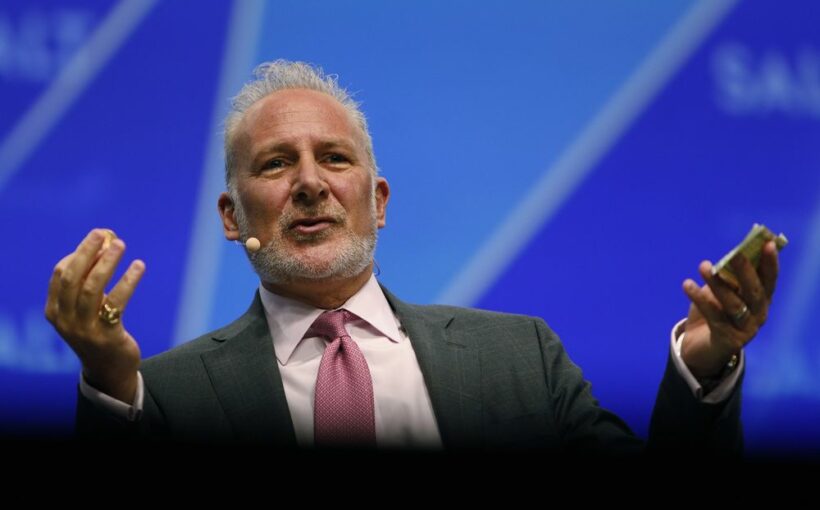Peter Schiff is an economist, gold advocate, and one of Bitcoin’s biggest critics. He has never liked the digital currency.
He believes that real value is derived from an asset’s ability to create commercial demand in markets; and always refers to gold as a perfect example of this. In contrast, he says that Bitcoin is nothing but an asymmetric store of value with no other use except attracting an endless supply of buyers for the limited supply of assets. In short, it is a Ponzi scheme. However, he has been proven wrong over and over again.
In his most recent critique of Bitcoin, Schiff said it is not a real asset. This was in response to a tweet by Twitter CEO Jack Dorsey about the possible arrival of hyperinflation in the U.S. soon.
Schiff Responds To Dorsey
On Saturday, October 23, Jack Dorsey shared his opinion on the current economic situation in the U.S on Twitter. He tweeted about the imminent hyperinflation as a result of the constant money printing in the U.S., and how the rest of the world would suffer from it.
Related Reading | Is Hyperinflation Inevitable? Jack Dorsey Says It’ll “Change Everything”
In response, Schiff tweeted that people should not look to Bitcoin to save them because it is not a real asset. Instead, they should own real assets like gold.
Just don't expect to find any refuge from it in #Bitcoin. To protect yourself from #hyperinflation you'll need to own real assets. #Gold qualifies, but Bitcoin does not.
— Peter Schiff (@PeterSchiff) October 24, 2021
Another Twitter user commented that Bitcoin is, in fact, real. And that it has just surpassed the Swiss Franc in Market cap. At this point, Schiff replied, calling the cryptocurrency a “make-believe asset” and that it is the adult version of an imaginary friend.
#Bitcoin is a make believe asset. Sometimes kids have imaginary friends. It's the same concept, except with adults.
— Peter Schiff (@PeterSchiff) October 24, 2021
Peter Schiff’s Grudge with Bitcoin
According to this Wikipedia profile, Peter Schiff is an American stockbroker, financial commentator, and radio personality. He is also CEO and chief global strategist of Euro Pacific Capital Inc., a broker-dealer based in Westport, Connecticut. Additionally, he is involved in various roles in other financial services companies, including Euro Pacific Asset Management, an independent investment advisor, Schiff Gold (formerly Euro Pacific Precious Metals), a precious metals dealer, and Euro Pacific Bank, a full-reserve bank.
In addition to all these, Schiff is known for something else – his grudge with Bitcoin. He has always claimed its value will one day drop to nothing.
Earlier this year, Mark Cuban told Schiff to “move on” because “gold is dead.” In Response, Schiff said, “Mark, a lot of your athletes wear gold jewelry. Ask them why. Gold has many uses outside of jewelry that contributes to its value as a metal. It’s not hyped at all. Gold is money. Bitcoin is 100% hype. It’s nothing.”
Related Reading | Mark Cuban Slams Peter Schiff: Gold is Dead, Bitcoin and Ethereum Are Today
Cuban himself used to be a bitcoin skeptic, preferring bananas to bitcoin because he claimed he could at least eat a banana.
In an interview on Good Evening San Diego a few days ago, Schiff referred to Bitcoin as a fool’s gold and a digital pyramid scheme. He also said that the SEC should not be encouraging people to participate.
BTC trading at over $62K | Source: BTCUSD on TradingView.com
When asked about the SEC’s recent approval of Bitcoin ETFs, he responded that “we should get rid of the SEC”.
He continued by saying, “I have no problem with the ETF itself, but if the SEC is pretending that it is some kind of watchdog and trying to make sure that investors don’t get hurt, then it makes no sense that they would approve this ETF because ultimately, the ETF is going to collapse to zero and the people who are left holding the bag are going to get wiped out.”
Schiff is also not impressed with futures ETFs. He says, “instead of owning nothing, you own a futures contract to gamble on nothing.”
Source: Read Full Article
